The Institute for Research in Language Teaching (Tokyo) – Celebrating a 100–Year History
Writing about web page https://warwick.ac.uk/fac/soc/al/research/collections/elt_archive/halloffame/hornby/archive
by Richard Smith

2023 marks the centenary of the Institute for Research in Language Teaching (語学教育研究所), which was originally established as the Institute for Research in English Teaching (IRET) in May 1923, with Harold E. Palmer (1877–1949) as its founding Director.
In the 1920s and 1930s, together with reform-minded Japanese academics and schoolteachers, Palmer – and, from 1936 onwards, A.S. Hornby (1898–1978), Palmer's successor both as head of research at IRET and editor of its Bulletin, engaged in an ambitious programme of materials production and practical inquiry directed at the improvement of English teaching in Japanese schools.
At that time, no such serious attention was being paid to issues of teaching English as a foreign language anywhere else in the world, including in the UK or USA. Following World War II, the importance of this pre-war work in Japan largely went unacknowledged, whether in Michigan, birthplace of the named discipline of applied linguistics (1946 or so onwards), or in the UK, where Hornby was instrumental in establishing 'ELT' as a recognized field of interest.
Nevertheless, pre-war IRET initiatives had been influential in establishing the value of research into the teaching of English for speakers of other languages– with a less theory-driven, less 'applicationist' orientation, though, than was to become dominant in post-war applied linguistics. Just two manifestations of post-war IRET influence internationally, both connected with Hornby's continuing work in the UK, were what later became the Oxford Advanced Learner's Dictionary of Current English– originally conceived as an IRET project and first published in Japan in 1942, and the journal English Language Teaching(now, ELT Journal), set up by the British Council at Hornby's suggestion in 1946, explicitly on the model of the IRET Bulletin.
'English' changed to 'Language' in the title of the Institute in 1942, and its post-war activities have been less internationally inclined, as other research centres and initiatives became established post-war both in Japan and elsewhere. In fact, close-to-practice, localized research to benefit English teachers in Japanese schools has remained the Institute's top priority, and this can be seen as its main strength as imported applied linguistic fashions have come and gone elsewhere (JACET [the Japan Association of College English Teachers], originally an off-shoot of IRLT, has by contrast engaged strongly with worldwide applied linguistics to the extent of hosting the 1999 AILA [International Association of Applied Linguistics] World Congress. To coincide with the conference, IRLT brought out an international edition of Palmer's Selected Writings(in 10 volumes) but fashions have moved on, and these did not garner much interest outside Japan. (My book The writings of Harold E. Palmer: An overview was issued as a companion volume to that remarkable set of volumes (pictured below), which we have in the Warwick ELT Archive).
The most recent list (in Japanese) of IRLT's active research / discussion groups, which still bring together novice and experienced schoolteachers, research students and academics committed to the improvement of English teaching in Japanese schools, displays the following areas of practical focus:
- Teaching methodology(with a particular focus on how teachers can use English in the classroom and use textbooks as a resource)
- Lesson study, involving video-recording and collaborative discussion of actual lessons
- Palmer research– participants read works by Harold Palmer and discuss their relevance to current teaching
- Elementary school English teaching, involving discussion of issues in the transition to junior high school as well as how to teach English at elementary level
- Discourse grammar(with a particular focus on applications in high school English teaching)
- Junior and Senior High School English teaching, according to particular topics – for example, a recent focus has been placed on how to activate students’ self-expression in English
- Researcher training(open to all members of the Institute)
In a recent talk ('Why history (of ELT)? Whose history?') for the Warwick Applied Linguistics seminar series, I acknowledged the value for me personally of participating in IRLT activities in Tokyo in the 1990s – the way this showed me the potential benefits of promoting 'historical sense' in the wider ELT profession and the way it led indirectly to construction of the Warwick ELT Archive; and in another recent talk, this time for IRLT itself, I highlighted the value of a tradition of experience-based, close-to-practice research characteristic of work by Palmer, Hornby, IRET and IRLT, viewing this as a counterbalance to prevalent top-down, 'linguistics applied' type conceptions of the relationship between research and teaching. The IRLT contribution to the development of my own thinking as a teacher educator and ELT researcher is, I think, clear, as is my continuing belief that the Institute's contributions and achievements should be more widely known.
Finally, then, as a kind of 100th birthday memento for IRLT, we've been making publicly accessible online some items in the Warwick ELT Archive collection which relate specifically to A.S. Hornby's work with IRET in Japan and his subsequent relations with Japan. Made widely accessible for the first time here are a variety of interesting items which have found their way to us, including photographs, a copy of the IRET Bulletin edited by Hornby, a 1942 catalogue with details of IRET publications (for those who read Japanese) and both a 1956 recorded talk in Tokyo and a 1969 NHK radio interview.
Fittingly, this – and other ongoing digitization work – has been made possible by a generous grant from the A.S. Hornby Educational Trust, itself set up more than 60 years ago with royalties from the dictionary Hornby compiled with two colleagues at other Japanese universities, E.V. Gatenby and H. Wakefield. The dictionary would not have been conceived or published without the inspiration and support of the Institute for Research in English Teaching, now 100 years old and still going strong.
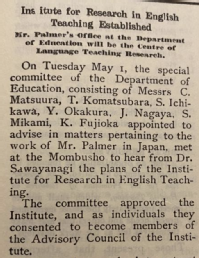
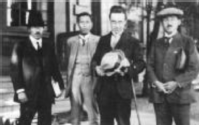
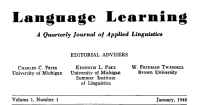

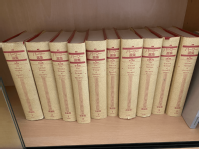
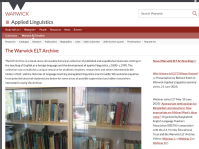
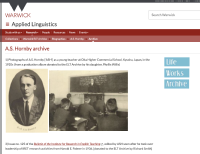
 Richard Smith
Richard Smith

 Loading…
Loading…
Add a comment
You are not allowed to comment on this entry as it has restricted commenting permissions.